More than 20 years ago, when Chikezie O. Madu was a high school science teacher in his native Nigeria, he likely never envisioned his students extracting their own DNA in the classroom and analyzing their genes. Today, he is doing just that as an Advanced Placement biology teacher in the Memphis, TN, Shelby County School District, thanks to The Jackson Laboratory's Teaching the Genome Generation (TtGG) program.
Advancing genetics education in the Memphis Shelby County Schools
Featured Article | April 4, 2023
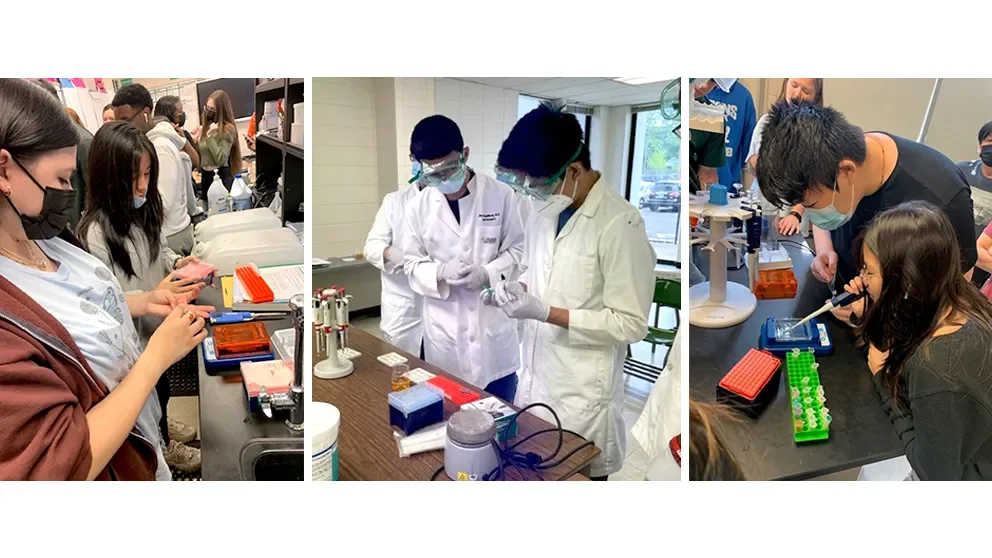
Empowering high school science classrooms
TtGG is a teacher professional development program, created by The Jackson Laboratory (JAX) and modified by Dr. Madu and the team at the University of Tennessee Health Science Center (UTHSC) to provide high school science teachers the content knowledge, teaching strategies and resources needed to enhance student learning in genetics, genomics and personalized medicine. Genetics is the study of individual genes and heredity (the passing of genetic information and traits from parents to offspring), while genomics is the study of complete sets of DNA, including all of the genes in a person.
Through the program, teachers gain relevant skills, as well as access to materials and techniques for teaching genetics and genomics, including lab equipment, consumable lab supplies (pipets and sample tubes) and reagents such as enzymes and chemicals to complete the lab portion of the TtGG curriculum. The program is supported by a National Institutes of Health (NIH) Science Education Partnership Award (SEPA).
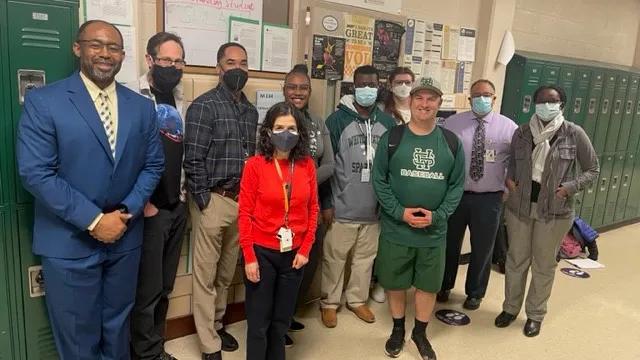
The TtGG training program comprises an in-person short course, which initially targeted high school science teachers in the New England states but has now extended to Memphis. Participating high school teachers implement molecular biology and bioinformatics experiments in their teaching labs, as well as Next Generation Science Standards-aligned, inquiry-based lessons that can be integrated with their school’s biology curricula. In addition, a self-paced, virtual course is available to educators across the globe where they learn molecular genetics, the use of bioinformatics, and about ethical issues surrounding genetics research and medical genetic testing.
“Genetics is a core component of all high school curricula,” says Charles Wray, Ph.D., vice president of education at The Jackson Laboratory, who created the TtGG program in 2012. “Our efforts through Teaching the Genome Generation act as a significant catalyst for teacher training and improving biology education, through modern human genetics and genomics topics.”
Bringing Genetics Education to Memphis
In 2016, Chester W. Brown, MD, PhD, Chief of the Pediatric Genetics Division at the University of Tennessee Health Science Center (UTHSC), became intrigued by TtGG after hearing Wray deliver a presentation about the program at the American Society of Human Genetics meeting in Vancouver, Canada, and spoke with Wray afterward. Brown later asked his Genetics Clinical Director, Nora Urraca, MD, PhD, to identify Memphis schools that would be good candidates to implement the program. Dr. Urraca approached Madu, a 2012 PhD graduate of the UTHSC College of Graduate Health Sciences, and the advanced placement and dual enrollment biology instructor at White Station High School, about attending TtGG’s short course and implementing the program. Supported by JAX and a grant that Brown and UTHSC had received from the Assisi Foundation of Memphis for a larger project, Madu completed TtGG training in the summer of 2017, and has since used the program to teach genetics and genomics to nearly 800 biology students at all skill levels.
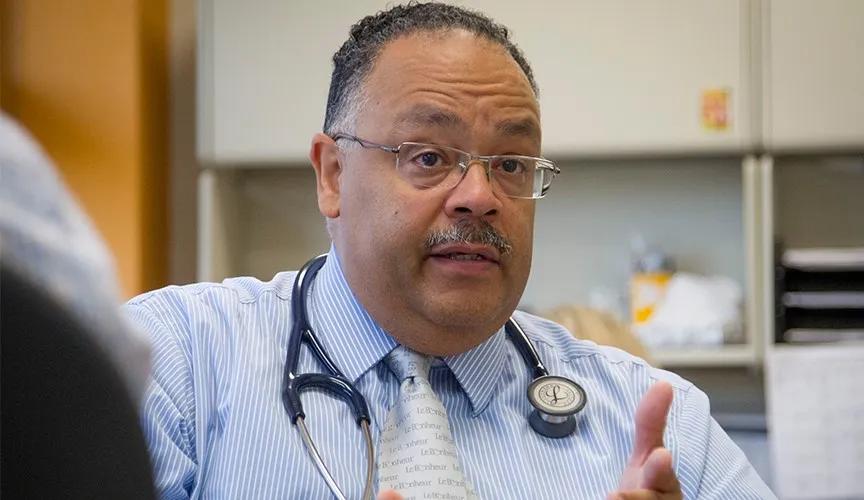
Now with additional funding, even more students in the Shelby-Memphis County school district stand to benefit from the TtGG curriculum. Wray and colleagues at JAX were granted a supplemental award to their SEPA grant through the NIH’s Diversity, Equity, Inclusion, and Accessibility Mentorship program. Funds from this award will be used to purchase state-of-the-art lab equipment and supplies to support the TtGG labs and will enhance the TtGG professional development “hub” in Memphis.
Teaching the Teachers
Madu says the 2017 short course not only taught him what content to teach in genetics but how to teach genetics. “I had been teaching genetics in my classroom for a few years,” says Madu, “but there was still a limitation, where I was approaching the content purely from a head-knowledge perspective. When I took the TtGG program, I was taught and trained in the genetics curriculum, but also how to spark the students’ interest in genetics and genomics.”
The Memphis Shelby County School District is the largest public school system in Tennessee and the 23rd largest in the nation, with more than 6,000 teachers and nearly 110,000 students. The schools’ minority population, mostly Black, is 94% compared to the statewide public school average of 40%, with many students coming from low socioeconomic backgrounds.
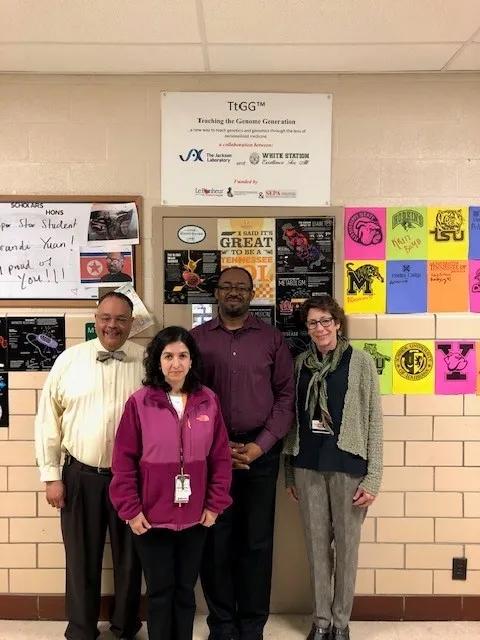
(l to r) Chester Brown, Nora Urraca, Chikezie O. Madu (Pioneering members of the program) with Vicki Park, retired UTHSC faculty and former SEPA award recipient.
Madu says TtGG, in addition to teaching students genetics, helps to address a critical issue in education: several science teachers leaving the classroom because they lacked the confidence to teach their students current science content. Teachers, he says, can only teach to the limit of what they know.
Promoting advanced genetics and STEM education
The TtGG curriculum provides high school science teachers the knowledge base to confidently teach students advanced concepts in genetics and genomics—and helps to keep the teachers themselves in the classroom. With the enhancement of the Memphis training hub, in addition to AP-level instructors, teachers at all levels of biology instruction—from ninth through 12th grade—will receive training through TtGG, with Madu as a trainer/mentor and the assistance of graduate students and postdoctoral fellows from UTHSC, such as Anneliesse Braden and Maria Namwanje, PhD, who are integral team members, contributing to both strategic planning and teacher training for the Memphis program.
“The underlying principle of all of this is that kids, at all levels, get to benefit from the genetics curriculum, not just the top of the top,” says Brown.
Impacting Students
TtGG’s impact on student performance is evident at White Station High. For three consecutive years, the school has had historically high performance on the AP Biology exam, an unintentional benefit of the program that could be translatable to other schools in the District.
Brown, Madu, Urraca and Wray concur that teaching genetics and genomics to high school students is essential, because genetics will be part of their lives going forward. “We need to address a number of issues that are going to be part of students’ reality in the future,” says Brown. “That was the motivation for targeting high school students, because they are the ‘Genome Generation.’”
At White Station High, Madu says the genetics curriculum has sparked an interest among his students and, in turn, has led to better attendance, better performance, and better behavior. Students are more engaged and more excited about coming to school. “Literally,” he says, “I’m pushing students out of my classroom at the end of the day because they don’t want to leave.”
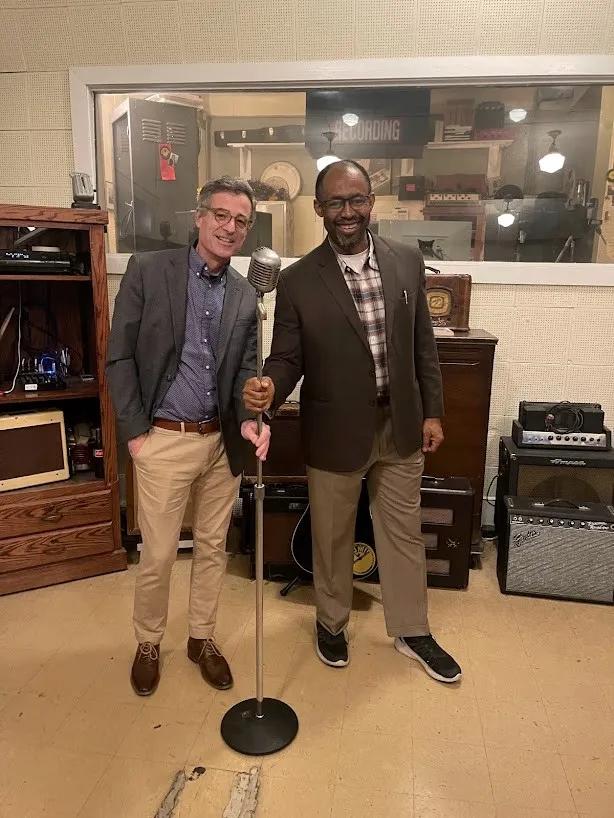
Beyond test scores, another benefit for students is an increased understanding and depth of knowledge about how important genetic information is in their lives. Madu relates a story about one of his students, whose parent had a medical diagnosis with a substantial genetic component. The student attended doctors’ appointments with her mother and was able to interpret DNA genetic test results, which the mother herself did not understand. After learning genetics in the classroom, the student was able to help her mother make an informed medical decision. Madu’s own daughter has a genetic condition. After participating in the TtGG curriculum in his class at White Station High, she has a newfound understanding and appreciation of her condition and, because of the knowledge she has gained, a deeper interest in participating in a clinical trial.
Brown and Madu say the TtGG curriculum also has an immediate benefit in terms of promoting STEM education. Not only do teachers become more confident in their ability to teach subjects such as molecular biology and genetics, and thus advance STEM education, more students are becoming interested in pursuing science-related majors in college. Several of Madu’s students, who studied genetics as high schoolers, are now pursuing doctoral degrees in the sciences at colleges such as Stanford, Columbia and UCLA. Wray believes JAX’s work in Memphis is “important in terms of building awareness about biomedical careers among underserved future STEM leaders.”
Future Growth
Wray says expanding TtGG beyond the Memphis Shelby County School District depends on additional funding. In Memphis itself, the program has recently expanded from just White Station High School to Craigmont High, with two other schools—East High and Central High—taking part in in the 2023 professional development program in June. UTHSC will soon apply for its own SEPA grant, which could help to provide the curriculum, customized to the needs of the School District, to even more high schools in Memphis. An important component of the Memphis program will be systematic evaluation of the outcomes over time for both students and teachers, an effort that will be spearheaded by Dr. Urraca. It will also include additional topics of relevance to medical genetics, a particular strength of the team at UTHSC. As more teachers get trained in the genetics curriculum, Madu says they will have much greater impact, making a difference in the lives of teachers, students, parents, and the community.
“We have a word in Swahili – ubuntu – which means community,” says Madu. “This program is ubuntu.”
